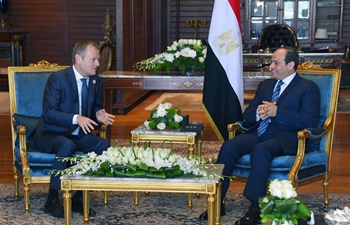by Xinhua writers Ma Qian, Pan Lijun, Luo Jingjing, Xu Xingtang
NEW YORK, Feb. 24 (Xinhua) -- The Chinese yuan (CNY) has sharply appreciated against the greenback in the past week, wrapping up Friday's trade with a high of 6.71 per U.S. dollar and notching the largest weekly gains since Jan. 11.
Analysts and industry insiders believed that market optimism across the board on potential progress to be made in China-U.S. trade relations, as well as the long-term resilience of the Chinese economy, has fueled the yuan's rally to pick up steam during the week.
MARKET OPTIMISM ON U.S-CHINA TRADE RELATIONS
A principal driver for the yuan hinged on upbeat market expectations and constant updates on this week's trade talks between China and the United States.
The yuan started to rise on Monday, after the two sides agreed on Feb. 15 to hold a new round of economic and trade talks in Washington in the past week following the meeting in the previous week in Beijing, which both sides said had led to some progress.
"An important factor explaining the recent CNY appreciation is the increased market confidence on U.S.-China trade talks and the prospects of a trade truce between both countries," Alejo Czerwonko, emerging markets strategist at UBS Global Wealth Management, told Xinhua.
Investors and traders have turned into a risk-on sentiment, as hopes for easing the lingering trade tensions boosted their appetite for riskier assets.
That has at the margin reduced demand for the U.S. dollar as a safe-haven currency. A weaker dollar has also underpinned the yuan's strength over the week.
Ben Randol, a senior foreign exchange strategist at Bank of America Merrill Lynch, also believed that the global foreign exchange (FX) market and other asset classes have recently been "infused with optimism about a U.S.-China trade deal," which has led to a declining tendency in the dollar.
"The more positive progress on U.S.-China trade policy is perceived to be, the more strength we see in traditionally riskier currencies, such as AUD, as well as the currencies of more economically open economies, such as the euro," Randol told Xinhua.
The Australian dollar (AUD), widely regarded as a barometer of global risk sentiment, extended marked gains against the greenback for three days during the week, i.e. Tuesday, Wednesday and Friday, ending the final trading day at 0.7133 per dollar, a sharp increase of 0.75 percent from the previous day.
Some analysts cautioned that a disruption to the trade relationship between China and the United States would roil international economies.
"The trade negotiation between the Unites States and China has a direct influence on the currency markets," said Anthony Minardo, vice president and FX trader for Bank Leumi USA. "There will be a massive increase in currency volatility and large revaluations of global currencies (in case of deterioration of trade tensions)."
DOVISH FED PRESSURING GREENBACK
Trade optimism has not been the only relevant factors behind year-to-date FX moves. As global FX markets have already priced in a series of positive updates regarding trade, other drivers tend to be longer term and are likely to play a growing role looking ahead.
The overall dovish tone by the U.S. Federal Reserve has recently added pressure on the dollar, causing the yuan to strengthen, as the market has already factored in the slowdown in future rate paths, experts said.
The dollar index, which measures the greenback against six major peers, has been sliding on a downward path for four trading days of the past week, except Thursday.
"The dollar index has turned lower since the start of the week due to one major reason, the Fed has continued to become more dovish with respect to interest rates in the United States and the pace going forward," Minardo told Xinhua.
"The overall consensus is for rates to remain on hold for the short to medium term and as a result the market has sold the dollar," he added.
The central bank pledged a "patient and flexible" approach to future policy tightening moves, as a way to "manage risks while assessing incoming information bearing on the economic outlook," according to its latest meeting minutes released on Wednesday.
The Fed has decided to maintain the target range for the federal funds rate at 2.25 to 2.5 percent, said the minutes of the Jan. 29-30 policy meeting of the Federal Open Market Committee (FOMC), the monetary policy arm of the Fed system.
"Participants pointed to a variety of considerations that supported a patient approach to monetary policy at this juncture as an appropriate step in managing various risks and uncertainties in the outlook," the minutes said.
These details are dovish in nature and point to the greenback experiencing a gradual depreciation in the coming months, on the back of "signs of slower economic activity," according to Czerwonko, the UBS strategist.
"January's minutes reveal that several FOMC participants were of the view that no more hiking this cycle would be necessary unless inflation were to exceed expectations," said Czerwonko.
Echoing his concerns, BlackRock Investment Institute pointed out in a latest report that the U.S. economic expansion is shifting into "a late-cycle phase" of the business cycle, the final phase before a downturn, as fiscal and monetary stimulus is dissipating while the impact of protracted trade tensions is biting back.
"We assess that it will enter the late-cycle phase at sometime in the first half of this year," Elga Bartsch, chief economist at the institute, said Thursday while briefing the report themed the global economy and 2019 outlook.
She noted that the projection was based on analyzing a wide range of U.S. economic variables, including a slowdown in growth, gradually increase in wage inflation, the employment rate being below the natural rate, credit ratio and the savings behavior of the private sector.
OUTLOOK FOR TURNAROUND IN CHINESE ECONOMY
Asked about the recent yuan appreciation, Bartsch talked about one factor that could help support the Chinese currency in a long term, as she believed exchange rates pick up much different information and are always based on a relative basis.
"One thing that might help explain the pattern is the fact that we now know Chinese assets will be included in a number of indices in the not so distant future," Bartsch told Xinhua. "Some of that should support the Chinese markets and create some inflows into Chinese assets."
International financial information provider Bloomberg will include Chinese yuan-denominated government and policy bank securities into Bloomberg Barclays Global Aggregate Index, starting in April, enabling further opening up of China's bonds market, the company confirmed on Jan. 31.
Chinese bonds will become the fourth largest currency component, following the U.S. dollar, euro and Japanese yen, after full inclusion.
China's bonds market stood at about 86 trillion yuan (about 12.84 trillion U.S. dollars) by the end of 2018, with about 1.8 trillion yuan (about 270 billion U.S. dollars) held by global investors, up 46 percent year on year.
"We see that the Chinese government is taking very decisive steps to stimulate the economy, both on the fiscal policy side, and on the monetary and financial policy side," said Bartsch.
"In our view, it's just a question of time until this will start to show in the economic data," she noted.
Although they held China's economic growth seemed to be decelerating at the moment, researchers at BlackRock believed there would be a turnaround in the Chinese economy with a modest growth re-acceleration.
"The Chinese economy looks likely to regain its footing in the first half of 2019," said the outlook report co-authored by Bartsch, as policymakers in China have started to moved toward policy easing with efforts to provide economic stimulus while limit financial leverage.
More specifically, Bartsch mentioned two main measures, i.e. fiscal policy impulse coming through major tax relief measures to boost revenues, and credit impulse to change credit flows with a clear focus on more channels toward small and medium-sized companies than state-owned enterprises.
BlackRock also expected the People's Bank of China, or China's central bank, to ease its liquidity provisions, so as to avoid stoking capital outflows and putting pressure on the yuan exchange rate.
(Zhang Zhongkai in Beijing contributed to the report.)















